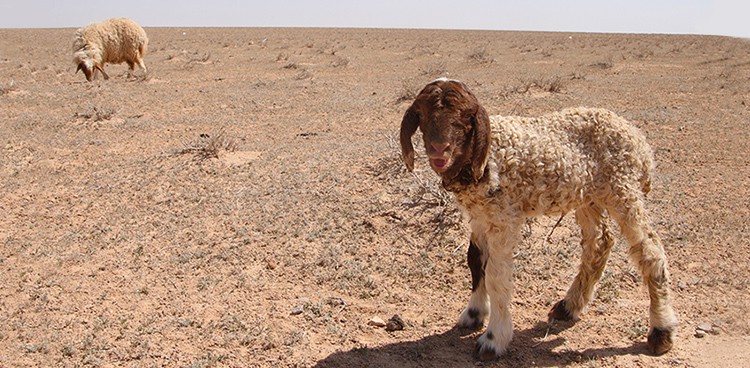
Origin
A fat-tailed sheep of Middle Eastern origin, the Awassi is one of the world’s hardiest and best-producing breeds of sheep. Through centuries of natural and selective breeding, the Awassi became the ideal sheep for both the nomadic and the settled, agrarian cultures of southwest Asia, including the bedouin and fellahin shepherds of Iraq, Saudi Arabia, Syria, Jordan, Lebanon, Palestine, and Israel. Its breeders purport that this is the breed of sheep that existed when Jesus lived.
To thrive in the brutal desert conditions and on the sparse, arid grasslands of this region, environments not normally suited to sheep production, the Awassi have adapted to traveling great distances in search of food and water. In large parts of the Awassi’s range, the sheep depend solely on natural grassland for sustenance. When the grazing is good, the Awassi store extra fat in their broad, thick tails, which they can then utilize for energy during times when food is scarce. In fact, in Saudi Arabia, the tail of the Awassi is sold separately as a rich source of cooking fat, used in much the same way as Americans use lard.
Appearance
In addition to this unique energy storage solution, the Awassi have developed other behavioral and physiological traits to help them cope with the challenges of their native environment. During the hot months the Awassi graze in groups, keeping their heads in the shade below the bellies of their flock mates. Their carpet-type fleece also traps a layer of air, which serves as a thermal barrier, protecting their skin from the intense heat and solar radiation.
Along with their fat tails and hairy white coats, Awassi sheep also sport dark brown faces and legs (another useful adaptation to protect them from the harsh sun) and long floppy ears. Rams have large, curled horns, while females are usually polled. They are quiet, docile animals that enjoy human contact and are easy to keep and breed. Andy Karras, a commercial sheep breeder in Rock Hill, South Carolina, who mostly raises the more common Friesian sheep, also keeps a small flock of Awassi. “I love these animals,” he declares. “They are really durable—less prone to disease like parasites and pneumonia.” Karras is in the process of expanding his breeding operation to offer Awassi sheep and embryos that originate from Israel by 2013.
Milk
The Awassi is the most common milk-producing breed in the Middle East, although these sheep are also raised for meat. According to Karras, the milk of Awassi ewes can contain as much as 13 percent butterfat (as compared to the 8 percent of Friesians) and is well suited to cheesemaking. The fellahin and bedouin use Awassi milk for the production of baladi cheese, a soft unripened cheese with a mild, slightly salted flavor. It is also used to make bryndza, a feta-style cheese, as well as a variety of other styles, including blues and bloomy rinds.





